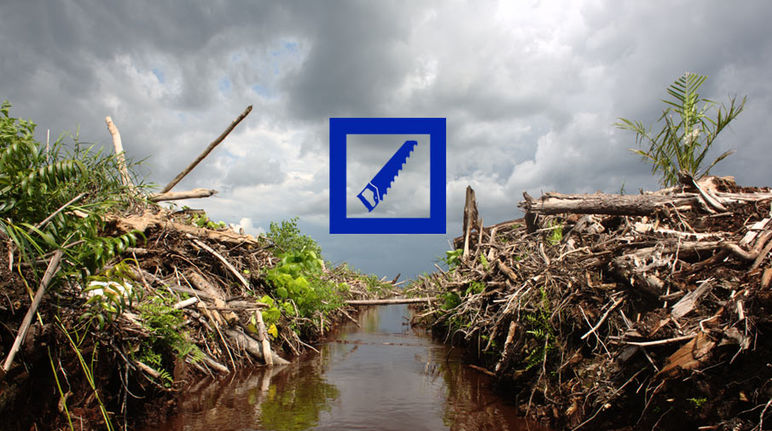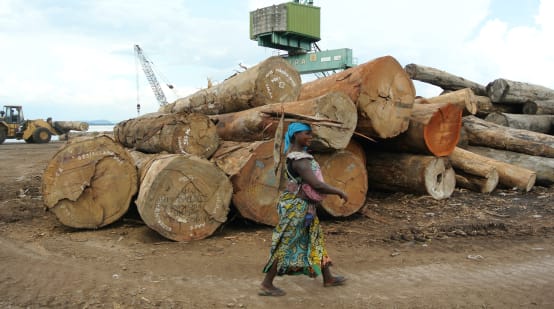Indonesia: Deutsche Bank finances deforestation
 German money for deforestation in Indonesia (© FoE)
German money for deforestation in Indonesia (© FoE)
Indonesian palm oil producer Bumitama Agri considers itself to be above the law. The company runs two illegal plantations, is clearing forest for more, and has broken promises to put an end to its illicit practices. Deutsche Bank is among its financiers. Please call on Deutsche Bank’s co-CEOs to stop financing plantations.
News and updates Call to actionTo: CEOs of Deutsche Bank and other financial institutions and pension funds
“Deutsche Bank must end its business relationship to Bumitama Agri, an operator of illegal plantations.”
Indonesian palm oil producer Bumitama Agri has been under considerable pressure since Friends of the Earth (FOE) exposed the company’s illicit practices in the detailed study “Commodity Crimes”, an account of irregular permits, illegal deforestation and threatened orangutans. In 2013, Bumitama Agri repeatedly pledged to stop clearing forest for its Ladang Sawit Mas (LSM) plantation on Borneo.
It does not appear to have changed its practices, however. FOE used satellite images to document the deforestation of a further 500 hectares for the LSM plantation during the summer of 2013. The forest was still being cleared as of February 2014. The company also admitted to FOE that it was producing palm oil on its GY Plantation without a permit, yet it has no intention of giving up the 7,000 hectares. “This shows that Bumitama Agri is lying to its shareholders and the public,” says Anne van Schaik of FOE. By tacitly approving the marketing of illegal palm oil, the plantation operator’s financiers and the palm oil traders Wilmar International and IOI Corporation have become accessories. Several international banks – including HSBC, Amundi, Rabobank and Deutsche Bank – finance Bumitama Agri and hold stakes in the company (see Background). The shares of the financial institutions amounted to $4.56 million, and they have extended loans valued at $125 million, FOE reports. Deutsche Bank is involved with $690,000. In light of this small stake, putting an end to the business relationship would be of little consequence to the bank. Without the support of international banks, Bumitama Agri would likely find it difficult to continue its illegal practices.
Please call on the management of Deutsche Bank and other institutions to stop financing plantations.
BackgroundThe company
Bumitama Agri is headquartered in Jakarta and holds more than 200,000 hectares of land in Kalimantan and Sumatra. According to FOE, the company had converted 60 percent of its land into plantations as of 2011. In 2012, Bumitama Agri posted a profit of €68 million.
The investors
Numerous financial institutions hold stakes or have granted loans to Bumitama Agri:
Amundi (75% Credit Agricole, 25% Société Générale)
MassMutual Financial Group
Schroders
Deutsche Bank
BlackRock
State Street Corporation
Wellington Management Company
Fidelity Investments
IndexIQ
SVM Asset Management
HSBC
Rabobank
Manulife Financial
The buyers
The EU countries currently import six million tons of palm oil annually, and the volume is on the increase. Palm oil is increasingly being used in the production of biodiesel, a consequence of the misguided biofuels policies of the EU member states.
The RSPO palm oil seal
Bumitama Agri has been a member of the Roundtable on Sustainable Palm Oil (RSPO) since 2007. The standards of the RSPO seal are very low, however, and do not afford the rainforests effective protection.
Video: a paradise lost
To: CEOs of Deutsche Bank and other financial institutions and pension funds
Ladies and Gentlemen,
The Indonesian palm oil producer Bumitama Agri is a client of your financial institutions. The company is acting illegally on at least two of its plantations and is clearing forest without a permit. Bumitama Agri’s practices are described in detail in the Friends of the Earth (FOE) study, “Commodity Crimes”.
In April and October 2013, the company pledged publicly to cease its illegal practices. However, current satellite images reveal that large-scale deforestation is continuing on the Ladang Sawit Mas (LSM) plantation in Kalimantan on Borneo. The company is thus breaking its promise.
Furthermore, Bumitama Agri intends to continue to operate its GY Plantation, even though the company has admitted to violations of the law to FOE.
Without financing from banks such as HSBC, Amundi, Rabobank and Deutsche Bank, Bumitama Agri would find it difficult to continue its current business practices. Environmental and human rights organizations in several countries are calling on the financial institutions involved to put an end to their relations with Bumitama Agri. International pressure on the palm oil producer’s financiers is thus increasing.
Please take the international criticism of Bumitama Agri and its backers seriously and stop your financing of palm oil plantations.
Sincerely,
The issue – rainforest on our dinner tables and in our fuel tanks
At 66 million tons annually, palm oil is the most commonly produced vegetable oil. Its low world market price and properties that lend themselves to processed foods have led the food industry to use it in half of all supermarket products. Palm oil can be found in frozen pizzas, biscuits and margarine, as well as body creams, soaps, makeup, candles and detergents.
Few people realize that almost half of the palm oil imported into the EU is used as biofuel. Since 2009, the mandatory blending of biofuels into motor vehicle fuels has been a major cause of deforestation.
Oil palm plantations currently cover more than 27 million hectares of the Earth’s surface. Forests and human settlements have been destroyed and replaced by “green deserts” containing virtually no biodiversity on an area the size of New Zealand.
The impact – suffering and death in producer countries, climate havoc
The warm, humid climate of the tropics offers perfect growth conditions for oil palms. Day after day, huge tracts of rainforest in Southeast Asia, Latin America and Africa are being bulldozed or torched to make room for more plantations, releasing vast amounts of carbon into the atmosphere. As a consequence, Indonesia – the world’s largest producer of palm oil – temporarily surpassed the United States in terms of greenhouse gas emissions in 2015. With their CO2 and methane emissions, palm oil-based biofuels actually have three times the climate impact of traditional fossil fuels.
Palm oil is not only bad for the climate: As their forest habitat is cleared, endangered species such as the orangutan, Borneo elephant and Sumatran tiger are being pushed closer to extinction. Smallholders and indigenous people who have inhabited and protected the forest for generations are often brutally driven from their land. In Indonesia, more than 700 land conflicts are related to the palm oil industry. Human rights violations are everyday occurrences, even on supposedly “sustainable” and “organic” plantations.
As consumers, we are largely unaware of these broader issues, yet our daily palm oil consumption also impacts our health: refined palm oil contains large amounts of harmful fatty acid esters that are known to damage DNA and cause cancer.
The solution – a revolution on our dinner tables and in our fuel tanks
Only 70,000 orangutans still roam the forests of Southeast Asia, yet the EU’s biofuels policy is pushing them to the brink of extinction. Every new plantation on Borneo is destroying a further piece of their habitat. Stepping up the pressure on policymakers is a must if we want to save our tree-dwelling kin. Apart from that, however, there is still a lot we can do in day-to-day life.
Follow these simple tips to recognize, avoid and combat palm oil:
- Enjoy a home-cooked meal: Use your imagination: why not try almond-coconut-pear biscuits? Or pizza with potato and rosemary? A meal cooked from fresh ingredients beats processed foods containing palm oil every time. Oils such as sunflower, olive, rapeseed or flaxseed are ideal for cooking and baking.
- Read labels: As of December 2014, labeling regulations in the EU require food products to clearly indicate that they contain palm oil. However, in the case of non-food items such as cosmetics and cleaning products, a wide range of chemical names may still be used to hide the use of palm oil. A quick check of your favorite search engine will turn up palm oil-free alternatives, however.
- Remember that the customer is king: Ask your retailers for palm oil-free products. Write product manufacturers and ask them why they aren’t using domestic oils. Companies can be quite sensitive to issues that give their products a bad name, so inquiring with sales staff and contacting manufacturers can make a real difference. Public pressure and increased awareness of the problem have already prompted some producers to stop using palm oil.
- Sign petitions and write your elected representatives: Online campaigns put pressure on policymakers responsible for biofuels and palm oil imports. Have you already signed all of Rainforest Rescue’s petitions?
- Speak out: Protest marches and creative action on the street raise public and media awareness of the issue, which in turn steps up the pressure on policymakers.
- Leave your car at home: Whenever you can, walk, ride a bicycle or use public transport.
- Be informed and inform others: Big Business and governments would like us to believe that biofuels are good for the climate and that oil palm plantations are sustainable. Spread the word – share this information with your family and friends and encourage them to rethink their consumption habits. It’s in our hands!














 Recent successes
Recent successes